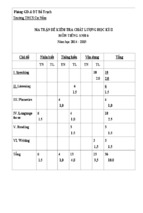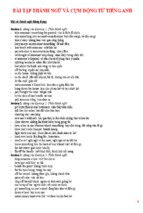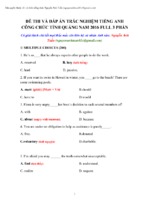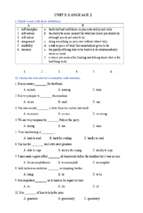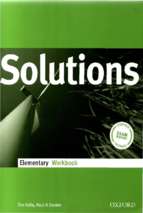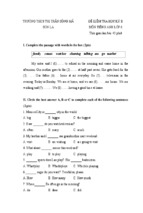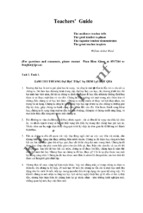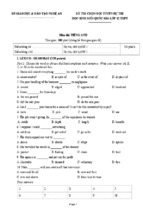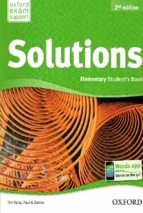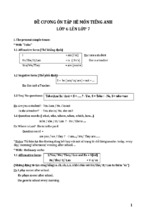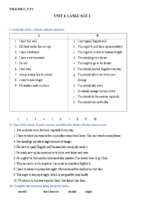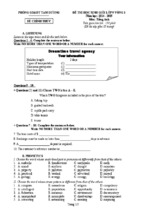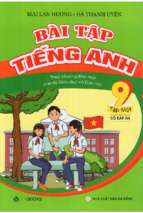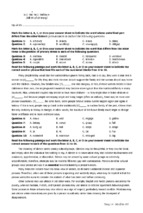Gold Experience
Introduction
Welcome to Gold Experience, a five-level exam
preparation and general English course for teenagers. The
five levels, which correspond to the Common European
Framework of Reference levels A1, A2, B1, B 1+ and B2,
provide thorough preparation for Cambridge English Key
for Schools, Preliminary for Schools and First for Schools
examinations and comprehensive language development.
The topics are from contemporary contexts such as the
Internet, social media, television and magazines, as well
as content-rich CLIL topics from which your students will
learn about the world.
Gold Experience offers a complete package of print and
digital materials which provide maximum flexibility for
your teaching situation.
Gold Experience is a fast-paced course written to engage
and motivate teenage students with varied,
age-appropriate topics and activities which will make
English lessons enjoyable and productive for both you and
your class.
Blended package
Print package
Digital package
Print and digital Gold Experience
package offers maximum flexibility
with both print and online
components.
Print Gold Experience is a complete
teaching package with a print
Workbook.
Digital Gold Experience is the ideal
package for schools working in a fully
digital environment.
For the student:
For the student:
For the student:
Students’ Book
MyEnglishLab
For the teacher:
eText IWB software
MyEnglishLab
Teacher’s Online Resource Materials
4
Gold ExperieNce
Students’ Book & Multi-ROM
with audio and video
Grammar and Vocabulary Workbook
For the teacher:
Students’ Book & Multi-ROM
with audio and video
Grammar and Vocabulary Workbook
Teacher’s Online Resource Materials
Students’ eText
MyEnglishLab
For the teacher:
eText IWB software
MyEnglishLab
Teacher’s Online Resource Materials
Gold Experience A2 Components
Gold Experience A2 is ideal for pre- and young teenagers
at pre-intermediate level in general English classes and
those who are working towards the Cambridge Key (KET)
for Schools examination.
Students’ Book
The twelve topic-based units offer thorough input and
practice of reading, writing, listening and speaking
skills, with topic vocabulary and grammar presented in
situations which exemplify their meaning and use.
There are many opportunities for students to share their
ideas, opinions and knowledge of the world. Lessons start
with a Power Up activity which is designed to activate
students’ existing knowledge and stimulate their interest in
the topic.
Learner training is an important aspect of Gold
Experience. Skill and Exam tips give clear, simple advice
on how students can develop their language and exam
skills. Word XP boxes highlight aspects of lexis, for
example, collocation and forming nouns from verbs, so
students develop good vocabulary-learning strategies.
Each unit in Gold Experience has a Video clip either
from TV or filmed especially for the course. The TV clips
are fully integrated with the main reading text, while the
other clips show teenagers involved in topic-based tasks,
activities and mini-dramas that students use as a basis for
project work.
MyEnglishLab
Gold Experience MyEnglishLab includes all the Workbook
exercises in interactive format along with additional
reading, writing, listening and speaking skills, as well as
practice and review tests. With instantly graded activities
plus tips and feedback, students are supported and
guided to successfully complete the exercises.
Also on Gold Experience MyEnglishLab are the Students’
Book video and audio.
Teacher’s Online Resource
Materials
All the support a busy teacher needs is available online on
the Pearson Portal or through your local Pearson rep.
• Teaching notes with a wealth of additional classroom
ideas, integrated answer keys and audio scripts
• Photocopiable worksheets
• Unit, mid- and end-of-year tests
eText for teachers
eText for teachers is a digital component for classroom use
on an interactive whiteboard. Available online or on disk,
it contains the Students’ Book in digital format with links
to audio, video, games and the Teacher’s Online Resource
Materials.
MyEnglishLab for teachers
After every two units there is a Revision spread which
reinforces the vocabulary and grammar students have
learnt.
The teacher view of MyEnglishLab gives you a full
learning management system with a range of practical,
problem-solving teaching tools.
eText for students
• You can assign tasks to the whole class, groups or
individual students depending on their needs.
• The communication tools allow you to send messages
to your students and, if you wish, keep in contact
outside of class.
• The gradebook lets you see how individual students
and the whole class are progressing.
• The common error report enables you to see which
problems are the most common and which of your
students are making these mistakes. With this
information, you can focus classroom time on the
areas that need the most work.
• The review tests can be assigned at the time that suits
your teaching programme.
eText is the students’ online or tablet component which
contains the Students’ Book pages with integrated links to
audio, video and games.
Workbook
The Workbook offers practice of all the vocabulary and
grammar areas taught in the Students’ Book and is
suitable for both classroom self-study and homework.
5
Students’ Book Organisation
Spread 1, pp 98–99
1
Discussion-based task to
raise interest in the topic
2
Gist activities to familiarise
students with the reading
text
1
3
Reading task in the style
of the Cambridge Key for
Schools exam
4
A task to help students
identify, summarise and
rephrase main ideas in the text
3
2
5
4
An activity that allows the
students to use English in a
personalised context
5
6
Topics are brought to life
in the classroom through
motivating video clips
6
Spread 2, pp 100–101
1
New vocabulary
presented through
engaging photos which
make the meaning clear
1
2
A useful vocabulary
learning tip
4
3
A fun activity that
encourages the use of the
key words
5
2
4
Clearly presented grammar
with example sentences
from the main reading text
and usage notes
5
Students practise the
pronunciation of the
grammar in model sentences
6
An activity that allows the
students to use the grammar
in a personalised context
6
Gold ExperieNce
6
3
Students’ Book Organisation
Spread 3, pp 102–103
1
Carefully staged activities
that develop listening skills
2
1
Exam tip to help students
succeed in the exam task
4
2
3
A second grammar point
with example sentences from
the listening and usage notes
3
4
Carefully staged activities
that develop speaking skills
and confidence
6
5
Useful functional language
that students need to
express themselves
5
6
Skill tip to help students
communicate effectively
Spread 4, pp 104–105
1
An example of the text type
which gives contextualised
practice of the grammar and
vocabulary needed for the
writing task
5
2
Carefully staged activities
that develop writing skills
3
6
Teen-appropriate writing
tasks that also prepare
students for the Cambridge
Key for Schools exam
2
1
4
3
A tip to help develop good
writing skills
5
An engaging video clip which
allows students to see and
hear English in use
4
7
6
Pre-, while and post-view
activities so students get the
most from watching the video
7
An open activity so students
present their ideas to their
classmates
7
Starter
Unit objectives
Reading:
Vocabulary:
Grammar:
Listening:
Speaking:
have got; is/are; present simple
there is/are; personal possessions;
countables/uncountables
Wh- questions
classroom language
pronouncing the English alphabet; asking
and answering about spelling
starter
(SB pages 6–7)
That’s me!
To start
If this is your first class, spend a little time getting to know
your students and letting them get to know each other. Here
are some possible first day activities:
Learning names
If this is the first time your students have met each other,
make sure they learn each other’s names! Introduce yourself,
saying your name and something you like, e.g. My name’s
. . . and I like swimming. Ask the student on your right to
introduce you to the class, e.g. Her name’s . . . and she likes
swimming. The student then must say his/her name and
share something he/she likes. This continues around the class
until the last student has to remember everyone’s name.
Three truths and a lie
Write three sentences about you on the board. One must
be a lie. Ask students to tell you which is the lie and give
reasons for their answers. This works best if your lie is not
too obvious! Now ask your students to write three sentences
about themselves, only two of which must be true. Students
read their sentences out in small groups and have to spot
each other’s lies.
Establishing ground rules
The first class is a good opportunity to establish ground
rules. You might like to prepare a class contract with your
students, which you both sign. Alternatively, write your top
five most important rules on a piece of paper and pin it to
the wall. Students work in small groups, taking it in turns to
go and read a rule, remember it and then run back and tell
their group members, who write it down. At the end of this
activity, students can compare their set of rules with the
original.
8
Gold ExperieNce
1 Focus students’ attention on the identity cards. Tell your
students that they are going to read the identity cards very
quickly to find out information. Read through the items in
numbers 1–7, checking that your students know what they
mean, and ask students to find examples of each, pointing
out that there are several possibilities in some cases.
Conduct feedback around the class.
1 Petit/Turan/Leyland/Yale 2 Kennett Street
3 M11 2WH / OX2 6YN 4 Turkish/British
5 Fabrice/Serap/Jacob/Jenny/John/Emma/Bonzo
6 2/4/2001, 24/08/2000, 12/07/2015, 03/08/2015, 13 November,
12/12/2010
7 0161 443 5788 / 01865 767 534
2 Students answer the questions individually and check with
a partner. Alternatively, you can conduct this activity as a
race, where students work in pairs to find the answer and
put up their hands as soon as they have found it. (You can
personalise this activity by providing coloured card or paper
and asking students to design and customise their own
identity cards. They can then add a photo or self-portrait if
they wish. These can be displayed on your classroom wall to
help your students quickly learn each other’s names.)
2 Serap 3 British 4 tennis
5 Sydney
6 Serap
7 Jenny
Vocabulary
3 Direct your students’ attention to the items in the photo and
to the words in the box. Students work in pairs to match the
items in the photo with the words. Conduct class feedback,
drilling the pronunciation of any difficult words. Ask students
to close their books. How many words can they remember?
A bag B jacket C trainers D comic E watch
H money I sunglasses J mobile phone
F keys
G apple
4 Focus students’ attention on the sentences and ask them
to complete them with a, an, some or any. Ask students to
check their answers with a partner, and monitor carefully,
seeing how well your students understand this language
area. Conduct classroom feedback, encouraging students to
discuss their answers as a class.
1 some 2 a, a 3 some 4 any
5 an, a
6 some, a 7 any
Listening
5 Ask students to read the questions and choose the correct
answer. Ask students where they think these conversations
take place (in a classroom).
➤ Track S.1
1
A: Can I have a pen, please?
B: Yes, here you are.
2
A: What page is it, please?
B: Page fourteen.
3
A: Can I open the window, please?
B: Yes, of course.
6 Students listen and check their answers.
1B 2A
3C
7 Students work in pairs, taking it in turns to ask and answer
the questions. Encourage students to use these phrases in
the English classroom on a daily basis. Ask students to work
in groups to choose a phrase and write it neatly on a postersized piece of paper. Display it in a visible place so students
will be reminded to use the target language. Ask students
to generate other classroom phrases and display these too,
e.g. Can I borrow your rubber, please? Could you say that again,
please?
Speaking
Note
Before you start the students on this speaking activity,
check their pronunciation and understanding of the English
alphabet. Then draw a large box on the board and write the
letter a on its own. Group the letters b, c and d together.
Explain that the letters in the alphabet can be grouped into
different sound families and ask students to give you more
letters to join the /i:/ (b, c and d family). Ask students to
copy the box and fill it in with the remaining letters of the
alphabet, grouping them in the appropriate places.
Conduct class feedback. Say the alphabet around the class.
Ask a couple of volunteers to spell their surnames and write
them up on the board.
8 Read the conversations aloud with one of the students. Give
students a minute to practise these with a partner. Focus
your students’ attention on the spelling game, drawing their
attention to the useful phrases in the Language XP box.
Monitor as your students play the game, noting any issues
with spelling or pronunciation.
Students’ own answers.
9 Organise students into pairs. Demonstrate the activity by
choosing a word from the page and nominating a confident
student to spell it out loud for you. Direct students to
the instructions in Exercise 9 and let them play the game.
Monitor as students do this, listening out for any commonly
mispronounced letters or spelling mistakes. Conduct class
feedback. Who managed to win the most points?
Students’ own answers.
To finish
Tell students that they are going to get to know their Gold
Experience coursebook. Ask students to work in small groups
and give them each a set of ten Treasure Hunt questions. See
which group can be first to answer all ten questions, e.g. In
which unit can I learn about technology? What is the title of
Unit 7? Which unit is all about food? What do we usually do
on the first two pages of a unit?
Homework
MyEnglishLab
/eɪ/ A H J K
/i:/ B C D E G P T V
/e/ F L M N S X Z
/aɪ/ I Y
/əʊ/ O
/u:/ Q U W
/ɑ:/ R
9
01
Enjoy yourself
Unit objectives
Reading:
Vocabulary:
Grammar:
Listening:
Speaking:
Writing:
multiple-choice questions; reading for
detailed information
hobbies and leisure; forming nouns and
verbs
present simple; adverbs of frequency; much/
many
completing notes; listening for detail
completing a conversation; likes and dislikes
an invitation to a friend; punctuation
Reading
(SB pages 8–9)
To start
Write the title of the unit on the board, and tell your
students that that they are going to be learning about hobbies
and interests in the next few lessons. Ask students to think of
something they like doing in their free time and get them to
write it down without showing anyone. Students now mime
their free time activity to their partner, who has to guess what
it is. Conduct class feedback: ask students to report back on
their partners’ free time activity, and write new vocabulary on
the board.
Power up
1 Focus attention on the photos and ask students to describe
what they see. Check students’ understanding of free time
by asking them when they have free time: are they having
free time now?
Elicit that free time is the time we have when we are not
at school or working. Nominate a student to answer the
questions. Then choose another student to ask you the
questions so that you model the kind of answers which
should follow, e.g. I like reading in my free time. I love walking
in the hills.
Give students a couple of minutes to ask and answer
the questions. Then find out if any pairs had interests in
common. Ask students to report back on shared likes and
dislikes. Which is the most popular hobby among your
students?
Students’ own answers.
10
Gold ExperieNce
Read on
Background
Jasmine Van den Boegarde and Fergus Gill are both real
people, so your students may wish to find out more about
them. Tell them that they can see Fergus’ photos or listen to
Birdy’s music online. You can do this in class if time permits.
Your students might ask why Jasmine’s nickname is Birdy. This
is because when she was a baby, she opened her mouth very
wide when she was feeding. Her family thought she looked
like a bird and she has still kept this nickname.
Fergus lives in a small village near the Sidlaw Hills, a very
beautiful part of Scotland. He is surrounded by woods and
farmland and doesn’t have to travel far to find wildlife.
2 Tell students they are going to read about two teenagers
with interesting hobbies. Focus on the photos and ask
students to describe what they see. Ask them to predict
what hobbies they are going to read about and write their
predictions on the board. Look at the text’s title: Teen Talent.
Check that students know what the word talent means (an
ability to do something very well).
Ask students to tell you about their classmates’ talents
and elicit the adjective: talented. If necessary, pre-teach
the following vocabulary using concept questions to check
students’ understanding.
• fans (people who love watching or listening to someone or
something very much). Is a fan a person or a thing? Are you a
fan of Britney Spears?
• nervous (to be worried or anxious about something). Is
nervous a good feeling or a bad feeling? When do you feel
nervous?
• to perform (to sing or act in front of an audience). Where do
people perform? What can people perform?
• to hang out (to spend time with people in a relaxed way). Do
you like hanging out with your friends? Where do you hang out?
• prize (something you get for winning a competition or doing
something very well). Are people usually happy when they win
prizes? What can people win prizes for?
• Give students a few minutes to read the texts in silence. Ask
them if any of their predictions were correct.
A Birdy
B Fergus C Fergus D Birdy
3 After students have had the chance to read the questions
and reread the articles, give them two minutes to fill in the
table. Give students the opportunity to check answers with
their partner before filling in the table on the board.
Isabella
First name: Ali
Country: USA
Hobby: writing songs, singing and playing the piano and guitar
Gill
First name: Fergus
Country: Scotland
Hobby: photography/taking photos
4 Refer students to the Exam advice. Students choose the
correct answers. Give them a minute to check their answers
with a partner before conducting whole class feedback. Ask
students to correct the wrong answers orally, by referring
them back to the text, e.g. in number 3, ask students to find
the word in the text which describes how Birdy feels before
concerts (she always get nervous before she performs).
1A 2C
3B 4A
5C
6A 7B
Sum up
5 Refer students back to the table they completed in Exercise
3. Direct students to the sentences in Exercise 5 and ask
them to work with a partner to make sentences about Birdy
and Fergus. Monitor, noting any problems you hear with
pronunciation and form, and discuss these in class feedback.
Students’ own answers.
Speak up
6 Give students a minute or so to prepare a reason for why
they think Birdy and Fergus have interesting hobbies, e.g. I
think Birdy’s hobby is interesting because she can travel a lot.
I think Fergus’s hobby is interesting because he can learn a lot
about different animals.
Ask students to share their ideas with their partner.
Reorganise the pairs into small groups and ask them to share
their ideas with their new group. In this way, the class should
generate plenty of ideas. Monitor the class, prompting,
encouraging and supplying language where necessary.
Conduct class feedback. Board any new language which
emerged in the group discussions.
Vocabulary
(SB page 10)
Hobbies and leisure
To start
Divide the class into two groups. One group has to
remember as many different facts about Birdy as they can;
the other has to remember as much as they can about
Fergus.
Give your students a minute to prepare and then draw a
line down the middle of the board, with Birdy and Fergus’s
names as headings on each side. Students from each group
take turns to run to the board and write down key words
associated with each teenager, e.g. singing for Birdy and
photography for Fergus. Read through the information on the
board as a class, and see which group remembered the most.
Students then work in pairs, taking it in turns to make
sentences about Birdy and Fergus with the vocabulary on the
board as prompts.
1 Focus students’ attention on the picture and then read
through the verbs in the box together. Ask students to work
in pairs and see who can be first to match the people in the
picture with the verbs.
Conduct whole class feedback, focusing students’ attention
on pronunciation. Ask students what other hobbies in the
picture have not been mentioned and board their answers:
play chess.
A fish
B paint C dance
D cook E sing
F read G draw
Word XP
Read the information in the Word XP box with your class
and ask students if they can think of more examples, e.g.
swim → swimming, paint → painting.
Write fishing and dancing on the board and ask students to
tell you which part of the word is stressed (the first part).
See if your students can think of any more verbs which
remove the final letter e in this situation, e.g. ride, make,
phone, bake, take.
Students’ own answers.
Game on
To finish
Ask students to choose the hobby which they found most
interesting, and organise students with the same choice into
pairs. Students work in pairs to write five questions which
they would like to ask Fergus or Birdy, e.g. Why do you like
your hobby? Where do you usually do your hobby? When do you
usually sing? Do you usually take photos alone?
Circulate, offering support and linguistic input. Once you have
checked your students’ questions, organise a roleplay where
students take on the roles of the interviewer or either one of
the teenagers.
Homework
MyEnglishLab
Organise students into pairs to play this game. Nominate a
student to demonstrate the activity with you in front of the
class. Let students play the game for a couple of minutes.
Monitor, noting down any particularly interesting hobbies
that students think of. These can be shared in the class
feedback.
2 Ask your students to fill in the gaps, adding -ing to the verbs
to make nouns. Check answers around the class, focusing on
natural sounding pronunciation and making sure that the -ing
is pronounced in its weak form: /ən/. Check that students
have spelled dancing correctly.
1 reading 2 fishing 3 dancing 4 cooking
5 painting 6 singing
11
3 Look at the spidergram and read the verb–noun collocations
together. Focus students’ attention on the words/phrases
in the box and give them a minute to attach the nouns to
the correct verbs. Give students an extra minute to see if
they can add any more collocations to the spidergram, e.g.
play football, collect key rings, go horse riding. Conduct class
feedback and collect new ideas. Draw a larger spidergram
on the board with your students’ contributions.
listen: to my iPod
watch: a film, TV
play: chess, computer games
go: on a sleepover, to the cinema
collect: comics, postcards
4 Students fill in the sentences with the verbs from Exercise 3.
Ask students to check with their partners that they have
remembered to use the correct form of the verb in each
case. Conduct feedback around the class.
2 goes
3 play 4 listen
5 collects
6 watch
Speak up
5 Nominate a student to read the conversation with you.
Students work in pairs to ask and answer questions about
each other’s hobbies. Conduct class feedback, sharing
examples of good language you have heard. If students
are finding it difficult to talk about why they like doing their
hobby/free time activity, then pause the activity. Write
down a few hobbies on the board and brainstorm ideas
about why your students might like doing them, e.g. It’s fun;
It’s relaxing; It’s exciting; I can do this hobby with my best friend.
Students’ own answers.
To finish
Write down the questions What’s your favourite hobby? and
Why do you like it? on the board.
Organise a class mingle, where students talk to as many other
students as they can, asking these two questions. After three
minutes, stop the activity and ask the students to return to
their seats. Working with a partner, they have two minutes to
jot down everything they remember about their classmates
and their hobbies. Conduct class feedback: who has managed
to remember the most about their classmates’ hobbies?
Homework
Workbook pages 4–5
MyEnglishLab
12
Gold ExperieNce
Grammar
(SB page 11)
To start
Give each of your students a hobby from Exercise 3 in the
vocabulary lesson. If you have a big class, you may need some
extra hobbies, but make sure they collocate with one of the
verbs from this exercise. (Extra hobbies could be the piano,
tennis, swimming, soft toys, etc.)
Call out different verbs: when the students hear the verbs
their hobby collocates with, they have to stand up. For
example, if you call out play, then students who have the
following hobbies should stand up: the guitar, computer games
and chess.
Quickly check they have collocated correctly by asking them
to say the verb with their hobby. If they have not got the right
collocation, they are out of the game!
Grammar XP
Read through the examples in the Grammar XP box. Check
that students understand the meanings of the words habit
and routine. You could focus on students’ timetables and
when they learn English, e.g. every Tuesday and Thursday, so
they get a personalised concept of a routine.
Focus students’ attention on how to form questions and
negatives in the present simple tense. You could mark the
rising intonation in questions and falling intonation in short
answers on the board, which will be useful when students
practise speaking later on.
Nominate a confident student and ask them to tell you about
what they do in their free time, and write this on the board
using the third person form of the present simple, e.g. Cello
goes fishing with her brother.
Look at the adverbs of frequency together. Ask your chosen
student to tell you how often they do their free time activity,
using one of the adverbs on the timeline. Ask students where
they think this adverb should go in the initial sentence and
write it in the correct place.
Ask the class to think of questions they could ask the student
about his or her hobby. Write these questions on the board
for the student to answer.
1 Play Track 1.1 for students to listen. Then play Track 1.2 and
ask students to repeat. Focus attention on the pronunciation
of do you: /ʤu:/ and on the weak form of I. Practise saying
/jesədu:/ and /nəʊədəʊnt/ with the class.
➤ Tracks 1.1–2
A: Do you like dancing?
B: Yes, I do.
C: No, I don’t.
2 Students read the interview, working in pairs to complete
the conversation using the correct form of the present
simple. Read the completed text around the class. Focus
students’ attention on the pronunciation of doesn’t:
/dʌzənt/ and point out that /t/ is often not pronounced in
phrases with don’t, so don’t like becomes /dəʊnlaɪk/.
2 doesn’t read
8 don’t like
3 watches
4 love
5 go
6 enjoys
7 makes
3 Students fill in the blanks in the conversation and check their
answers in pairs.
2 Do/play
3 Do/sing 4 Does/have
4 Focus students’ attention on the photo. Ask them what they
think Luis’s hobby is. If students do not know the word street
dancing, then write it on the board. Ask students if any of
them have this hobby. Ask them: Where do you do this? What
do you wear? Who do you dance with? Students fill in the gaps
with the words in the box. Read the text around the class.
2 never stop
3 often watch
4 usually do
5 sometimes give
Write on
5 Write sentence heads on the board, e.g. I always, I usually.
Check students remember the adverbs of frequency –
draw a line across the board with never at one end and
ask students to come up and write the other adverbs of
frequency in the correct places. Draw students’ attention
to the sentence heads. They write five sentences about
themselves using the sentence heads and adverbs of
frequency.
Students’ own answers.
To finish
Draw a large square on the board and inside the square write
some answers to questions about you, focusing on free time
activities, but also on personal information, e.g. your hobby,
something you really don’t like doing, an adverb of frequency,
the name of someone you like to spend time with.
Students have to look at the box and ask questions to get the
answer, e.g. What do you do at the weekend? What do you not
like doing? How often do you go swimming? Who do you hang out
with at the weekend?
Give students a few moments to create their own box. Their
partner then has to think of questions to ask to match the
answers. Circulate, offering help with question formulation
where necessary and noting any issues for use in feedback.
Homework
Workbook pages 6–7
MyEnglishLab
Listening
(SB page 12)
To start
Find the longest wall in your classroom. Choose one end of
the wall and tell students that this is never. Nominate seven
students and give each of them an adverb of frequency:
always, usually, often, sometimes, not often, not usually.
Ask them to stand along the wall in order of their frequency.
Move along the wall, asking students to tell you their
frequency adverb and asking the rest of the class to decide
whether or not they are standing in the right place.
Go around the class, nominating students to choose hobbies.
Students must stand beside the adverb of frequency which
describes how often they do these hobbies. Ask students
Why are you standing there? and encourage them to answer
using the target language, e.g. Because I never cook.
Power up
1 Look at the photos of famous people. Ask your students if
they already know these celebrities and get them to give you
some information about them. Students match the celebrity
with their hobby and discuss their choices with a partner.
Encourage them to justify their answers.
Students’ own answers.
Background
Robert Pattinson is an English actor from the film Twilight.
Emma Watson is an English actress, famous for playing
Hermione in the Harry Potter films. Rafael Nadal is a Spanish
tennis player. Dianna Agron (eɪgrɒn) is an American actress
from the television series Glee and Zac Efron is an American
actor, famous for his role in the film High School Musical.
2 Play Track 1.3 and ask students whether their predictions
were correct.
➤ Track 1.3
1 Robert Pattinson likes reading.
2 Emma Watson loves painting.
3 Rafael Nadal enjoys fishing.
4 Dianna Agron likes cooking.
5 Zac Efron collects comics.
Students’ own answers.
Listen up
3 Read the exercise with your students. Make sure that
students know they have to focus on the people who are
not spoken about. Conduct whole class feedback.
13
➤ Tracks 1.4–5
Abbey: Hey, Joe, look at this website about famous people and
their hobbies. Look! I love Robert Pattinson!
Joe: You love everyone, Abbey! So what are Robert Pattinson’s
hobbies?
Abbey: Well, he likes reading – like me!
Joe: He plays the piano and the guitar. Wow! Look, he also writes
songs.
Abbey: And two of his songs are in the film Twilight. That’s my
favourite film – well, after the Harry Potter films.
Joe: Look, there’s Emma Watson from the Harry Potter films. How
many hobbies does she have?
Abbey: Lots! Look. Painting and drawing, playing sport and singing!
Joe: And she likes learning different kinds of dancing.
Abbey: Yes, she does break dancing! I’d love to learn break dancing.
Joe: Me too. Oh, look, Rafael Nadal. I think he’s amazing! What does
it say about his hobbies?
Abbey: That he doesn’t have much time for hobbies.
Joe: I’m sure!
Abbey: His favourite hobby is fishing, but he also likes going to the
cinema. And look, read this! He likes playing computer games!
Joe: Cool! He often plays computer games at tennis competitions.
He enjoys playing with other tennis players like Andy Murray. That’s
funny!
Abbey: Look at this person …
Abbey and Joe do not talk about Dianna Agron and Zac Efron.
4 Refer students to the Exam advice. Give students a minute
to look at the exercise and ask them to think of what kind
of words might go in the spaces. Play Track 1.5, twice if
necessary. Conduct whole class feedback.
2 the guitar
7 cinema
3 songs 4 sport
5 dancing
6 computer games
Grammar XP
Read the information in the Grammar XP box as a class.
Write English lessons and pocket money on the board and
ask students if these words are countable or uncountable.
Generate sentences using these words which are similar to
the examples given, e.g. How many English lessons do you have
a week? How much pocket money do you get? Practise asking
and answering these questions around the class.
Ask students: Can we add an -s on to the end of ‘lesson’? (yes)
Can we add an -s on to the end of ‘money’? (no). Explain that it
is not possible to add an -s to the end of uncountable nouns.
Ask students to think of more examples of countable and
uncountable nouns.
5 Listen to the questions and sentences in Track 1.6. Then
play Track 1.7 for students to repeat. Drill the questions/
sentences chorally and individually, focusing on the
pronunciation of do you have (/ʤu: həv/) and don’t have
much (/dəʊntəvmʌʧ/).
➤ Tracks 1.6–7
How many hobbies do you have?
How much free time do you have?
I don’t have many hobbies.
I don’t have much free time.
6 Give students a few minutes to complete the sentences with
much or many. Conduct class feedback orally.
2 many
3 much 4 many
Gold ExperieNce
6 much
To finish
Students work in pairs to write two sentences with much or
many on small scraps of paper.
Collect the sentences and divide the class into two teams.
Shuffle the scraps of paper and give each team a pile of
sentences. The teams must work together to decide which
sentences use much or many correctly and which do not.
Conduct feedback by asking teams to read out their pile of
correct sentences. Look at the sentences they have decided
were incorrect and ask them to explain why.
Homework
MyEnglishLab
14
5 many
Speaking
(SB page 13)
To start
Write two sentences on the board about your free time
activities: one true and one false, e.g. In my free time I like
fishing. I love cooking. Ask students to tell you which sentence
they think is true and to give reasons for their answer.
Organise students into four teams and ask them to write
a sentence about each team member’s free time activities.
Some should be true and some should be false. Students then
read out their sentences, while the rest of the class listen and
say whether they think the sentences are true or false.
Teams get points for correct answers and bonus points for
providing the correct information about their classmates, e.g.
Nico doesn’t like playing tennis; he likes playing the piano!
1 Tell your students how much free time you have on a school
day and at the weekend, e.g. I don’t have very much free time
on a school day. I start school at eight o’clock and I finish at four
o’clock. In the evening I have two or three hours of free time. At
the weekend I work at home a little bit and I do housework, but I
have more free time. What about you?
Ask students to discuss the question in pairs. Then open it
up to a class discussion. Who has the most free time?
Students’ own answers.
Speak up
2 Check understanding of board game, and ask students if
they have a favourite. Tell them they are going to listen to
two people playing a board game. Play Track 1.8, twice if
necessary, and let students fill in the gaps. Play it a third time
so that students can check their answers. Then write the
conversation on the board.
Students practise the conversation on the board in pairs.
Rub out a couple of lines and nominate a pair to read the
conversation, remembering the missing lines. Complete this
procedure, nominating different pairs each time until the
conversation has been completely rubbed out.
➤ Track 1.8
Dan: You go first, Katy.
Katy: OK, Dan. I think this picture is about music. Do you like
listening to music?
Dan: Yes, I love music.
Katy: When do you usually listen to it?
Dan: In the evenings. OK, Katy. My turn. Do you like art?
Katy: Yes, I enjoy drawing.
Dan: What do you usually draw?
Katy: People – I’m good at drawing people. Do you want me to
draw you?
Dan: Er . . . no, thanks.
2 love
3 art 4 enjoy drawing
5 usually
Nominate a confident student and ask questions, using the
listening script as a model, e.g. I think this picture is about
cooking. Do you like cooking, Evan? If the answer is yes, go on
to ask a few more questions, e.g. What do you usually like to
cook? When do you usually cook?
Students practise in pairs. Monitor, noting any particularly
good questions you hear. Regroup for class feedback, and
write down any interesting language you heard on the board.
Students’ own answers.
Game on
Focus students’ attention on the Game on box. Make sure
everyone has a coin and that they know what heads and
tails means. Read the rules of the game together. Then read
the Skill advice together. Students play the game with their
partner. Circulate, encouraging good language you hear.
Language XP
Direct students’ attention to the Language XP box. Read
through the items in the box together and check meaning
by answering personalised questions, e.g. Are you good at
maths, Maria? Ask students questions about their own likes
and dislikes and encourage them to use the target language in
their responses.
4 Split the class into two halves: A and B. Ask the A half of
the class to look at page 132 and the other half to look at
page 142. Focus students’ attention on the instructions and
explain that they need to write questions about free time in
the present simple using the prompts to help them. Write
the following on the board as an example: where / you / go
/ weekend? Elicit the question from the students: Where do
you go at the weekend? Ask students to write the rest of the
questions in pairs.
Explain to the students that they now have to answer the
questions and write their answers under the Me column of
the table. When students have finished this, nominate a few
students from different groups to answer questions about
themselves.
Students now move to work with a partner from a different
team. Indicate the second column in the table and tell
students that they have to fill this in with their partners’
answers. Nominate a few students to report back on their
partners’ answers.
Students’ own answers.
6 good at
3 Focus students’ attention on the board game. Go round
the class, eliciting the vocabulary for the pictures from the
students and listening out for any possible problems with
form or pronunciation.
15
To finish
Do more fluency work by playing Just a Minute with your
students.
Organise students into small groups. Tell them that they are
going to pick a hobby and speak about it for one minute
without hesitating or repeating themselves. Each group could
use a mobile phone to time the speaker. The winner from
each group can take part in a class final.
There is additional speaking practice on page 116 of the SB.
Homework
MyEnglishLab
Writing
(SB page 14)
To start
Take five A3 pieces of paper and write one of the following
verbs in the centre of each with a marker pen: listen, go, play,
watch and collect.
Put these pieces of paper on desks. They should be spaced out
around the room.
Divide your students into five groups; give each a different
coloured marker pen and ask them to stand beside one of
the pieces of paper. The students now have to work together
to think of as many nouns as they can to go with the verb.
They write these around the word in the middle. After thirty
seconds, shout Change! The students will now move on to the
next piece of paper. They should quickly look at the words the
previous group added and think of some new ones.
Continue this way until each group has had the chance to work
with a different verb. Stick the sheets up on your board. Which
group managed to think of the most words in each case?
Power up
1 Focus students’ attention on the photos, and ask them
to describe what the people in the photos are doing and
whether or not they like these activities. Encourage your
students to use the target language from the Language
XP box in the Speaking section on page 13, e.g. I love; I’m
good at; It’s amazing. Ask students to discuss the questions
in pairs and report back on their partners’ answers. Find
out what clubs your students go to. Board any interesting
contributions, generating as much vocabulary as possible.
Ask: where, when, how often, who with?
Students’ own answers.
16
Gold ExperieNce
2 Ask students to look at the noticeboard. Ask where the
noticeboard in their school is, and ask them to tell you what
kind of notices you might expect to find there. Ask students
to tell you what four types of clubs are advertised on the
noticeboard.
Tell students they are going to answer some questions about
the clubs and read through the questions together. Give
students three to four minutes to answer the questions.
Allow them to check with a partner before class feedback.
Ask students which club they would like to go to and
encourage them to give reasons for their answers, e.g. I want
to go to the football club because I’m good at football and I love
it. I don’t want to go to the chess club because I don’t enjoy
playing chess.
1 in the school library 2 Thursday evening at 7.15 p.m.
4 Room 12A 5 yes 6 yes 7 yes 8 no
3 6 p.m.
3 Tell students that Mario would like to invite his friend to a
singing club and has written her an email to invite her. Read
the email quickly, exaggerating the lack of punctuation. Ask
students why this email is difficult to understand and teach
the word punctuation if necessary.
Write the following sentence on the board: Punctuation
is important. Point to the capital letter and full stop in this
sentence and check that your students know the English
terms for these punctuation marks.
It has no punctuation.
Language XP
Read through the advice in the Language XP box, generating
examples on the board, e.g. Saturday, January, Can I go to the
camera club?
4 Students rewrite the email in Exercise 3 with the correct
punctuation. Get students to work in pairs and peer check
their work. Read through the email again, telling students to
call out when they have changed something.
Hi Lily,
Do you want to go to singing club with me? It’s every Thursday
evening in the gym at school. It starts at 7.15 p.m. They sing all kinds of
music. What do you think?
Mario
Plan on
5 Brainstorm all the different clubs students might like to
go to. The possibilities are endless here. If students seem
unsure, try asking them what they like to do in their free
time and invent a club for them. Even the student who is
only interested in playing computers or watching TV could
go to a computer games club or an appreciation society for a
favourite television programme.
Check that everyone has decided on a club. Now students
need to provide more details about their club. Read through
the headings, making sure everyone understands what
they mean. Ask what might be included in the important
information section, e.g. people might need to bring
something; the club is for a particular age group.
Students’ own answers.
Write on
6 Tell students they are now ready to write an email of
invitation to a friend. Remind them to use the information
in their plan in Exercise 5, and to refer to the correctly
punctuated version of Mario’s email in Exercise 4. Refer
students to the Skill advice.
Students peer correct each other’s work and discuss. Collect
the finished emails and prepare feedback for the next lesson.
Students’ own answers.
Model answer:
Hi Danny,
Do you want to come to the drama club with me? It’s every Friday
afternoon in the school gym. It starts at half past three and finishes at
five o’clock. It’s really good fun and we are going to start making a film
next week! It costs five pounds a year – what do you think?
Hope you can come!
Jenny
To finish
Divide the class into two teams. Give students a time limit
to choose five simple sentences from the lessons they have
just completed. Each team then takes turns at reading out
their sentences. The other team has to listen and write them
down, inserting punctuation where appropriate.
Team members then take turns at coming up to the board to
write their sentence and the other team checks whether or
not they have got the punctuation correct.
There is additional writing practice on page 116 of the SB.
Homework
MyEnglishLab
17
Switch on
(SB page 15)
Meet Ali Isabella
1 Focus students’ attention on the photo of Ali. Ask students:
Who is she? What do you remember about her? Read the
question as a class. Give students a minute to guess the
answer and discuss their ideas with a partner.
Conduct class feedback, asking students to give reasons for
their choice. Play the video. Ask your students to tell you if
their predictions were correct.
A Country music.
2 Read the sentences with your students. Check understanding
of perform (to sing or act in front of an audience). Check
students’ understanding by asking questions, e.g. Where do
people usually perform? What do people usually perform?
Play the video again while students watch and decide if the
sentences are true or false. Ask students to work in pairs,
correcting the false sentences. Conduct class feedback.
1T 2F
3T
4F 5T
3 Organise students into small groups. Ask them to think
about whether they would like to have a life like Ali’s and
discuss it with their group, e.g. It’s not an easy life because it
is very tiring travelling so much. They should give reasons for
their answer. Conduct class feedback, generating as much
new vocabulary as possible and writing it on the board.
Students’ own answers.
18
Gold ExperieNce
Project
4 Begin by preparing your own short talk about a hobby, and
bring some photos or equipment in for your students to
see. Ask students to write down one of their hobbies at the
top of a piece of paper. They then pass the paper to their
partner, who writes down five questions they would like to
ask about this hobby, e.g. How often do you do this? Who do
you do this hobby with? Do you need any special equipment?
Circulate, adding a question of your own to each student’s
paper and offering help with question formation.
Collect the questions. Write examples of correctly and
incorrectly formed questions on the board. Ask students
to identify the incorrectly formed questions and to correct
them. Students then use their partners’ questions as a basis
for preparing what they will say in the interview. Circulate,
offering input and ideas when necessary.
Finally, students conduct the interview. Give them the
opportunity to practise what they want to say before filming.
Play back the interviews, focusing in particular on intonation
in questions and correct use of the present simple tense.
Students’ own answers.
02
Can’t live
without it?
Unit objectives
Reading:
Vocabulary:
Grammar:
Listening:
Speaking:
Writing:
guessing unknown words
technology; verb–noun collocations
present continuous; present continuous
and present simple
completing a table; listening for information
describing a photo; saying where people/
things are
a description of an object; structuring written
work
1 Focus students’ attention on the photos and ask them to
describe the different ways in which they can see technology
being used. Their responses will give you an idea of what
some students already know in terms of both the present
continuous and topic-specific vocabulary.
Read the questions as a class. Allow students one minute to
note down their answers. Then, working in pairs, students
have two minutes to ask their partners the questions and
write down notes.
Nominate a few students to report back on what they have
learnt about their partner, but do not drag this part of the
activity out for too long.
Students’ own answers.
Reading
(SB pages 16–17)
To start
Write the word technology on the board. Allow students one
minute to work in pairs and list all the technology they might
use over the course of a typical day. Conduct whole class
feedback, writing up ideas on the board as students suggest
them, and generating as much vocabulary as possible. You can
prompt students by asking them to think of different rooms
in the house, different times of day, etc.
Ask students: Can you live without technology? and encourage
them to say what they think.
Power up
Background
A recent survey showed that the average British teenage
girl sends about thirty texts a day while a typical teenage
boy sends about twenty-one. British teenagers spend about
seventeen hours per week online, and when asked about
their favourite media device, most teenagers put their phone
above the television.
However, there are usually strict rules about using mobile
phones in school. In fact, any pupil caught with a mobile
phone in class is likely to have it taken from them until the
end of the school day!
Read on
2 Check students’ understanding of feelings, to miss something
and surprised by asking concept questions, e.g. Does a
computer have feelings? (no) Is surprised a feeling? (yes) If I
miss something does it mean I have it now? (no) Do I want it?
(yes)
Ask students to predict what it is that the pupils of
Southshore High School can’t use. Write down a few of the
students’ ideas on the board. Focus on the title of the article
and check understanding of tech-free. You could prompt
students by asking if it means ‘with technology’ or ‘without
technology’.
Set a time limit of one and a half minutes for students to
skim the text and find out what the students of Southshore
High School can’t use. Ask students to compare their
answers in pairs before conducting whole class feedback.
They can’t use technology.
19
3 Ask students what they do when they come across new
words. Explain that it is sometimes possible to work out the
meaning of a new word in a text by looking at the words
before and after it. Refer students to the Skill advice.
Set a time limit of two minutes for students to read the text
again. Tell them that they need to find words which match
the definitions in Exercise 3. You may wish to do the first one
together, as an example. Encourage students to work out the
meaning of the word entrance by focusing on the meaning of
the words around it: standing, next to, Southshore High School,
and asking students where they think the reporter might be
standing. Allow students an extra two minutes to complete
the exercise and write down their answers.
Organise students into pairs to check their work. Conduct
class feedback, making sure you ask students to tell you
which of the surrounding words helped them to get their
answers. Drill the pronunciation of new words chorally and
individually, e.g. diary /daɪri:/, bored /bəʊd/.
1 entrance
2 experiment
3 diary
4 hard
5 great
6 bored
4 Read out the questions around the class. Then give students
five minutes to read the report again and answer the
questions. Ask students to check their answers orally in
pairs or small groups. Monitor, checking that answers are
correct and listening to see how students are coping with the
pronunciation of the new lexis. Note down any issues with
comprehension or pronunciation, so that you can address
problems later on in the lesson.
1 their school diary 2 texts and emails
3 playing his guitar and going swimming
4 bored 5 his family
Sum up
5 Students match the smiley and unhappy faces with the
names in the table, referring to the text where necessary.
Students then work with a partner, taking turns to ask Who
likes the experiment? and Who doesn’t like it? and answering
accordingly.
Circulate during the task and encourage students to say
what specific words helped them to arrive at their answers,
and check that students are forming the third person of the
present simple accurately.
Paolo loves the experiment.
Adriana hates the experiment.
Tomas likes the experiment.
20
Gold ExperieNce
Speak up
6 Read the question with the class and ask students to answer
it in pairs, giving three reasons for their answer. If anyone is
struggling with this, ask them to think back to the text they
read, and different students’ reactions to the experiment.
Students report back on what they have heard about their
partner. In larger classes, you can group students in fours
and give each student a minute to report back on what their
partner said, as this will maximise student talking time.
Students’ own answers.
To finish
Ask your students to imagine that today is a tech-free day at
home and school. Ask students to imagine what difference
this is making to their lives. How are their lessons different?
What are they doing at home? How are they communicating
with their friends? How are they relaxing?
Discuss these questions with your class and write students’
ideas on the board. Then organise students into pairs and
ask them to conduct a roleplay, where they take it in turns
to interview each other about their thoughts and feelings.
Brainstorm some questions and write them on the board:
What are you doing in your free time without technology? Are you
enjoying this experiment?
Give students five minutes to do the roleplay with their
partners. Nominate a couple of students to perform their
roleplay in front of the class.
Homework
MyEnglishLab
Vocabulary
(SB page 18)
Technology
Note
With the current rate of technological innovation it is likely
that students will be using gadgets not mentioned in this
section! Encourage your students to tell you about any
devices which they feel have been left out.
To start
Choose five words from the last lesson and write them
on the board with the letters jumbled up, e.g. entrance,
experiment, download, technology. Put students in pairs and
explain that they have to race to work out what the words
are. Ask the winning pair to come up to the board to write
the answers.
1 Students match the items in the box to the items in the
picture. Make this into a competition to see who can be first
to find all the items and to spot which item has been left out.
A webcam
B screen
C keyboard
D laptop
E speakers
F mouse
G DVD player
H MP3 player
I headphones
The mobile phone has been left out!
2 Play Track 2.1 so that students can check their answers. Drill
some of the trickier pronunciation, e.g. /əʊ/ in /məʊs/.
Mark the correct word stress on the board.
➤ Track 2.1
A webcam
B screen
C keyboard
D laptop
E speakers
F mouse
G DVD player
H MP3 player
I headphones
3 Students match verbs to the corresponding nouns. While
students are working on this, copy the exercise onto the
board and invite volunteers to come up and show you how
they answered.
1b
2a 3d
4c
4 Students choose the correct noun for each sentence.
Check answers as a class, working on pronunciation where
necessary.
2 website
3 music
4 CD
5 mouse 6 laptop
21
Speak up
5 Ask students: How do you chat to your friends? and get them
to note down their answer. Check that students understand
the meaning of the expression face to face (in person, rather
than by phone or online).
Allocate five different areas of the room: one for each
preferred method of communication, e.g. on the phone, by
email. Ask students to stand in the area which represents
their choice.
Students talk with their group about why they have
chosen this method of communication. Monitor, providing
encouragement and vocabulary.
Conduct whole class feedback. What is the most popular
way of chatting to friends? What are the advantages and
disadvantages of phone chats, face-to-face chats and texting?
Alternatively, you can ask students to discuss the question
with the person sitting next to them. In class feedback ask
students to report back on similarities and differences.
Student’s own answers.
Word XP
Read through the examples given in the Word XP box. Invent
five email addresses, websites and mobile numbers and write
them on the board.
Ask students to practise the first one in pairs. After thirty
seconds call out Stop! and ask a student to read out the
address/number. Focus on pronunciation where necessary.
6 Explain that students are going to listen to a mobile number,
an email address and a website. You may need to play Track
2.2 twice. Ask students to read out their answers, then write
them on the board and drill pronunciation.
➤ Track 2.2
1 This is Mandy’s Music School. For information about music lessons
please call 07865477911. That’s 07865477911.
2 Hi, it’s Jennie here. Can you email me our science homework,
please? My email address is, Jennie2 at school dot A-C dot U-K.
That’s Jennie 2, J-E, double N, I-E-2 at school dot A-C dot U-K.
Thanks!
3 I’m sorry, but the sports centre is now closed. For opening times
please go to our website. W-W-W dot griffinsport dot com. That’s
W-W-W dot griffinsport, G-R-I, double F, I-N sport dot com.
1 07865477911
2
[email protected]
3 www.griffinsport.com
22
Gold ExperieNce
Game on
Ask students to think of an email address, website and
telephone number they know and to make a note of them.
They now have to read them out to their partner (without
showing them what they have written) and their partner has
to write them down. Ask your students to sit with their backs
to each other to increase the level of challenge!
To finish
Play a game of ‘broken telephones’. Think of a fairly simple
email address, e.g.
[email protected] and whisper it
to the student sitting nearest you. They must whisper the
address they have heard to the student sitting next to them,
who whispers it to the next person and so on. Whisper
another email address, e.g.
[email protected] to a
student on the other side of the class, so that whispered
addresses are going both ways.
Ask the students at the end of the chain to tell you the email
address they have ended up with – is it the same as the one
you started with?
Homework
Workbook pages 8–9
MyEnglishLab

